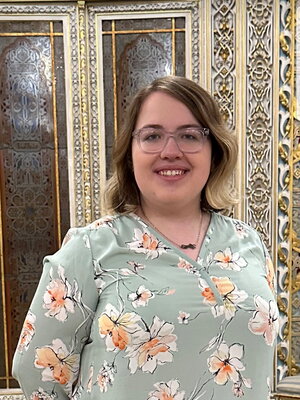We would like to congratulate Emily Sallenback, who was awarded the 2023 Senior Thesis Award as part of the Political Science Honors Program. We asked Emily to share a bit about her research experiences and future plans!
What was the title of your Thesis?
There's No "I" in Erdoğan: Predicting Power Personalization with Pronoun Usage in Turkey
What got you interested in the topic you researched?
My interest in authoritarian politics started when I took Prof. Avital Livny’s junior honors seminar, “The Government and Politics of the Middle East.” I was fascinated by the resilience of authoritarian regimes, especially following the Arab Spring protests. I was even more surprised when I read about the current global democratic backsliding and ongoing third wave of autocratization (although some of these claims are now in question). Seeing the signs of democratic backsliding in the US in recent years put into perspective how quickly political landscapes can change.
Personalization, the process in which a leader concentrates their power, can have drastic consequences in an existing or emerging dictatorship. A prominent example of a personalist leader making poor foreign policy decisions is Putin with the invasion of Ukraine. I find it intriguing that leaders are still able to personalize their power to such an extreme. As I continued to delve into authoritarian politics, the case of President Recep Tayyip Erdoğan’s personalization in Turkey piqued my interest. I was lucky to be advised by a scholar of Turkey, who taught the course sparked my interest in authoritarianism, Prof. Livny. With her mentorship, I developed a more nuanced theory of Prof. Amy Liu’s theory of pronoun usage as an ex-ante predictor of personalization, and I tested it in Turkey with a novel dataset. Despite not finding clear support for my hypotheses, I believe analyzing President Erdoğan’s rhetoric and plans to continue to personalize his power is increasingly important because of his recent reelection. I hope to continue studying this topic in depth in the future.
How did the Honors program/undergraduate thesis benefit you?
I gained a more thorough understanding of how to conduct research in political science because of the Honors program. The program is designed to help students understand and apply each step of the research process, from conceptualizing an idea to analyzing the data. I believe the abilities to critically think about a complex problem and complete a comprehensive thesis project are incredibly useful regardless of a student’s post-graduation plans. I personally find those analytical skills especially helpful when I analyze GPU traces and write up reports at my current job.
I also appreciated hearing about the other honors students’ projects during the program. I enjoyed watching others develop their projects over time, and then seeing the outcome of each project at the poster presentations. Everyone had such interesting projects on a variety of topics in political science.
You just graduated! What’s next?
I recently moved to California and started working full-time at Intel as a graphics software engineer. My job is to analyze how scientific computing applications scale on supercomputers and to optimize the performance of those applications. I am also about to start working part-time as a research assistant at the University of Michigan to make an R package for a new semi-supervised learning model for text classification. I plan to continue pursuing research opportunities in political science, especially computationally heavy projects that leverage my programming skills.
Any words of wisdom for current and future political science students?
Stay open-minded and flexible throughout college. I didn’t add political science as a major until my sophomore year, and then I changed my concentration halfway through my junior year. Although plans are great to have, college is an amazing opportunity to explore different areas of study, and ultimately career paths. Take this opportunity to challenge yourself by going outside your comfort zone. You might decide to stick to your original goals with added reassurance, but you also might find a new passion to pursue. I had an incredible time completing degrees in political science and computer science in parallel, and I was fortunate to find opportunities on campus at the intersection of the two. It seems like an unusual combination to many, but I discovered these interests because I remained introspective and curious as I progressed through my coursework.
